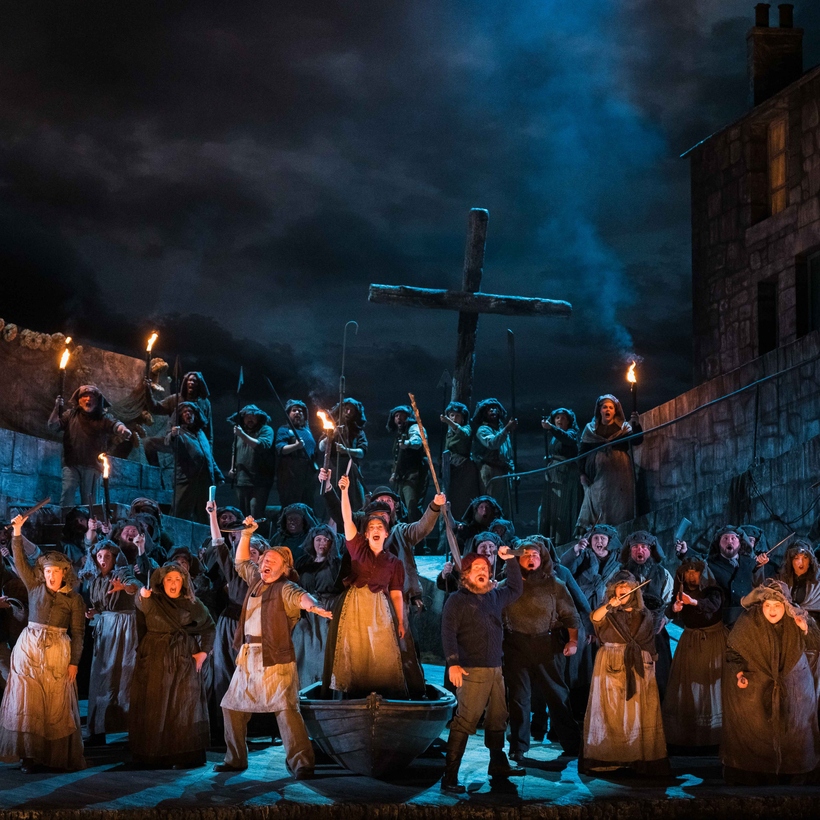Remember that dead white male Samuel Johnson? “Sir,” he declared in the 18th century, “a woman’s preaching is like a dog’s walking on his hind legs. It is not done well; but you are surprised to find it done at all.” What, one wonders, would he have had to say of the major general’s daughter Ethel Smyth (1858–1944)? As a political activist, Smyth once shared a jail cell with Emmeline Pankhurst, the leader of Britain’s women’s-suffrage movement. As a composer, she was likewise a force to be reckoned with—though her contemporaries faulted her bolder work as “too masculine” and her fluffier trifles as second-rate. Yet she was England’s first female composer to be granted the title of dame.
Her opera The Wreckers had a rocky premiere and few revivals in her lifetime. A Gothic tale set on the coast of Cornwall where villagers lure ships to their destruction and slaughter any survivors for the plunder, it has re-emerged once or twice in the last decade, with a major new production this month at Houston Grand Opera. In a recent e-mail exchange, the director Louisa Muller and AIR MAIL’s Matthew Gurewitsch discuss Smyth and the work she considered her greatest.

MATTHEW GUREWITSCH: There’s a big push now to recognize women artists who got no real shot in their time because they were women. Ethel Smyth—sorry, Dame Ethel Smyth!—doesn’t fit that mold at all. In her lifetime her masterpiece, The Wreckers, had premieres in Leipzig, Prague, and London, but none that made her happy. Too many cuts. Too few rehearsals. Always something! Suppose she could come back for The Wreckers in Houston. What do you think she would say?
LOUISA MULLER: I would argue that she does fit that mold. After reading contemporary criticism of her music as well as her own experiences hustling to have her music published and programmed, I think it’s safe to say that being a woman did indeed hold her back from wider acclaim and a more permanent place in the canon. In particular, she longed for more performances in her home country. Reflecting on a festival of her music in London in honor of her 75th birthday, she wrote this in her memoirs: “I have never yet succeeded in becoming even a tiny wheel in the English music machine … if I were ever to win through at all it would not be till I had one leg in the grave.”
I think she would be thrilled with the resources we are devoting to this production and the exceptional cast, orchestra, and chorus that will assemble in Houston to honor and breathe new life into The Wreckers. I don’t think she could have imagined that 116 years after its premiere The Wreckers would be presented in new productions on both sides of the Atlantic. We will do her proud.

M.G.: The story of The Wreckers chills the spine. Villagers on a lonely seacoast lure ships to their doom, kill any survivors, and live on the cargo. Piracy on dry land! Is there literal truth to this story, or would you regard it as more symbolic?
L.M.: There are elements of the story that we know took place—like many coastal areas, Cornwall has a lurid history of smuggling, and there were laws on the books that allowed wrecking (looting) of ships that went down if there were no survivors. Tales of intentional shipwrecks and murder of sailors may be apocryphal, but they do spark the imagination, don’t they? I guess the answer to your question is yes! It’s true and it’s symbolic.
M.G.: Whether a production looks traditional or contemporary, literal-minded or iconoclastic, a performance can’t help being a commentary on the world of today. If you had to spell out the implications of The Wreckers for the world we live in, what would you say?
L.M.: We’ve set our production in the 18th century, but the story of a religious community attempting to justify its harm and destruction as the Word of God feels awfully timely at this particular moment in history. I find in The Wreckers a real message of hope, that idealism can survive even under extreme conditions, and light can shine through the darkness.
The Wreckers is on at Houston Grand Opera through November 11
Matthew Gurewitsch writes about opera and classical music for AIR MAIL. He lives in Hawaii


 Discover
Discover